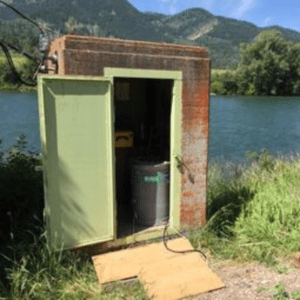The Monterey Bay Aquarium Research Institute (MBARI), a nonprofit oceanographic research center, has partnered with the U.S. Geological Survey (USGS) to develop a compact robotic device that protects and promotes critical biodiversity by monitoring invasive species that threaten aquatic ecosystems.
MBARI works to develop innovative technologies that assist researchers in studying and understanding oceans, rivers, streams, and other waterways. In 2019, AVDF awarded MBARI a $250,000 grant to support a project to develop the Environmental Sample Processor (ESP), an autonomous device that analyzes water samples to observe aquatic health.

MBARI Environmental Sample Processor (ESP) installed in Streamgage
The sample processor examines water samples, searching for genetic materials known as Environmental DNA, or eDNA. Because aquatic animals shed cells and waste that contain genetic material, scientist can measure the type and even density of fish and other organisms by measuring this eDNA. The “lab-in-a-can” robotic device collects water samples consistently over time so that scientists can also track changes in aquatic ecosystems, even in quite remote locations. The device saves time and resources while capturing high-quality data about native species and environmental threats.
MBARI is collaborating with the USGS to design a more compact and portable version of the Environmental Sample Processor. The compact processor will be able to fit into USGS-operated streamgages located throughout the nation. The device will be used in conjunction with the USGS eDNA assessment program for early detection of biological threats which is critical for conserving valuable resources in waterways.
For more information about the collaboration between MBARI and the USGS, click here.
Back to all Stories